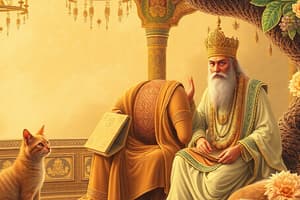Podcast
Questions and Answers
What are the three great original centers of philosophy in the world?
What are the three great original centers of philosophy in the world?
- Chinese (correct)
- Greek (correct)
- African
- Indian (correct)
Philosophy in the East is completely separate from religion.
Philosophy in the East is completely separate from religion.
False (B)
What is the difference between the Occidental and Oriental mindset?
What is the difference between the Occidental and Oriental mindset?
Occidental mindset is linear, while Oriental mindset is circular.
Eastern philosophy often includes concepts from __________ beliefs and myths.
Eastern philosophy often includes concepts from __________ beliefs and myths.
What does the term 'Loob' represent in Filipino philosophy?
What does the term 'Loob' represent in Filipino philosophy?
Which of the following best represents Filipino philosophy of time?
Which of the following best represents Filipino philosophy of time?
What does the 'Bahala Na' philosophy signify?
What does the 'Bahala Na' philosophy signify?
Which philosophical method bases truth on reasoning and critical thinking?
Which philosophical method bases truth on reasoning and critical thinking?
Existentialism asserts that truth is based on absolute realities.
Existentialism asserts that truth is based on absolute realities.
Flashcards are hidden until you start studying
Study Notes
Why Become a Philosopher?
- Three major philosophical centers globally: Greek, Indian, Chinese.
- Asian philosophical traditions predate Greek thought.
- In the 1st Century, Eastern philosophical activity surpassed Western activity.
- Greek philosophers: Socrates, Plato, Aristotle significantly shaped Western philosophy.
- Contemporary major philosophical ideas largely stem from Western thinkers.
Three Attitudinal Imperatives
-
Distinction Between East and West:
- Western mindset: Linear perception of life; beginning and end are distinct.
- Eastern mindset: Circular perception; life is cyclical with no absolute beginnings or endings.
- Concept of samsara emphasizes continuous cycles of life beyond rigid definitions.
-
Unity of Religion and Philosophy in the East:
- Eastern philosophy intertwined with religious beliefs and myths.
- For Oriental thinkers, life represents a synthesis of philosophy and action.
- Contrary to perceptions of poverty, the East's challenges stem from its holistic worldview rather than religion.
-
Validity of Intuition and Mysticism:
- Eastern philosophies often prioritize intuitive and mystical thinking over structured reasoning.
- Western philosophy often separates theory from practical application, leading to contested realizations of philosophical principles.
Filipino Thinking: From Local to Global
- Filipinos have a distinctive philosophy characterized by three core dimensions:
-
Loob (Interior Dimensions):
- Concept includes values like loyalty, hospitality, camaraderie (pakikisama), and respect for authority.
-
Philosophy of Time:
- Time is perceived as cyclic; incorporates concepts of karma and yin-yang dynamics.
- Filipino interpretation of time includes notions of delays in punctuality.
-
Bahala Na:
- Philosophy reflects complete trust in Divine Providence.
-
Methods of Philosophizing
- Philosophizing is a process of expressing and reflecting on beliefs, emotions, and opinions.
- Phenomenology: Truth is contingent on individual consciousness.
- Existentialism: Emphasizes truth derived from personal choices and freedom.
- Postmodernism: Accepts the relativity of truth, influenced by cultural contexts.
- Logic: Sees truth as a product of reasoned argumentation and critical thinking.
Studying That Suits You
Use AI to generate personalized quizzes and flashcards to suit your learning preferences.




